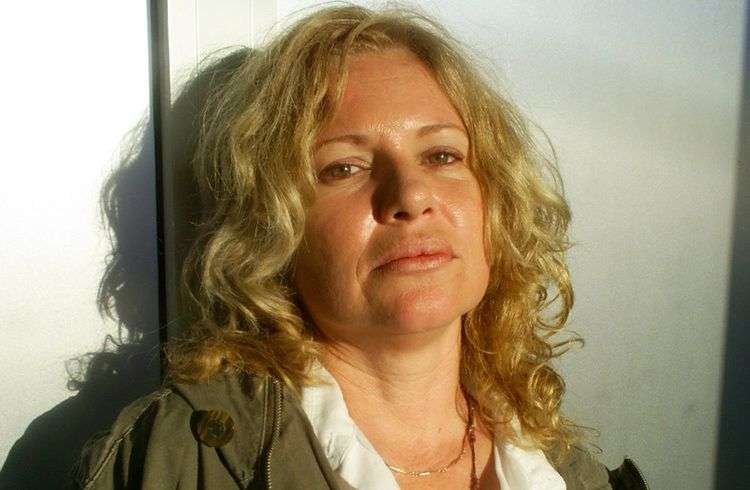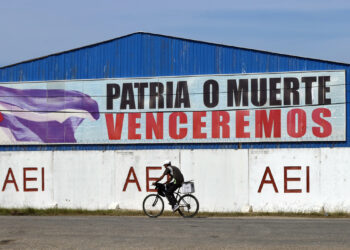(“Over the age of 50, I’m still a woman eager for working…” / Image: Taken from the Carlos Barba’s blog.)
Popular Cuban actress and producer Isabel Santos has just ended her latest documentary Viaje al país que ya no existe, which pays tribute to photography director Ivan Napoles, who used to be the eyes of Santiago Alvarez.
The material, which lasts 42 minutes, will be premiered next September 17 at the 23 y 12 Movie Theater, in Havana. The piece, produced by the Cuban Film Institute (ICAIC by its acronym in Spanish) and the Ministry of Information and Communications from the Socialist Republic of Vietnam, will be screened during the International New Latin American Film Festival as well as another four films in which its producer plays part.
Isabel Santos and Jorge Perugorria in the shooting of “La pared de las palabras”, directed by Fernado Perez.
Isabel, one of the most outstanding Cuban actresses, plays different roles in La pared de las palabras, by Fernando Perez; Vestido de novia, by Marilyn Solaya; Regreso a Ítaca, by Laurent Cantet and 25 horas, by Carlos Barba, which will be premiered soon. Since 2006, she decided to get behind the camera to give us, along with her partner Rafael Solis, the documentary San Ernesto nace en la Higuera.
Viaje a unpaís que ya no existe was shot in Vietnam. Isabel Santos and her production team and Napoles traveled to the Asian nation 40 years after the war. It is a chronicle about the return to the stage of memorable places in the history of that country. This meeting makes him laugh and cry. Over the rubbles of the past there is a different nation to that he knew.
Its producer told OnCuba they had chosen that tittle “because it is shocking the transformation that country has gone through”.
“I was surprised with Vietnam today. It was an intense and passionate shooting where I discovered a nation very different to that I had seen in heartbreaking images broadcasted when I was little”, noted the main female character of the film Clandestinos.
How did the documentary emerge?
It took me sometime to convince Ivan Napoles to share a portion of his diary with the audience. Ivan is a special man with an incredible sensitivity and with a lot of things to tell. I wrote the script along with journalist Arleen Rodriguez and I took the project to the Vietnamese Embassy in Havana to get some financing. We waited and made it. Then, we travelled to Vietnam, which seduced me with its colors and the hospitality of its inhabitants.
The documentary is based on Napoles’ experiences and anecdotes as war correspondent along with the historic founder and creator of Latin American ICAIC news, in an entirely opposite context, which sometimes made him cry for the radical innovations it underwent. From the black and white nation he shot, some decades afterhe found a colorful nation and full of life; from a frightened boy in a shelter he had captured in a picture in Hanoi, he was welcomed by a bunch of joyful children. The documentary is some sort of life tribute, because I don’t like posthumous homage, to that prestigious cameraman that is still active with over 80 years of age.
What would you like to highlight about the documentary?
The history, Ivan’s sensitivity and the resulting discovery of that nation that was able to rise from the ashes. I had a lot of material to edit and to set aside painfully. The music written and donated specially by Silvio Rodriguez was one of the greatest joys of this production, I thank him for that.
Do you consider yourself an actress or a producer?
I’m a woman eager for working, I always feel like shooting and I devote myself entirely to that. Over the age of 50 I’m eager for working and making accomplishments. I keep dreaming as I used to when I had my first role in a movie, I haven’t lost that and I think I never will.
I don’t consider myself a producer. I’m an actress. These incursions as director I still think of them as an intrusion. It all started nine years ago in Bolivia I was making a movie and the story just came up. I told my husband, who was the co-director, that I had come up with the idea for a documentary and then San Ernesto… emerged. I think at some point I will be able to direct morebut right now it is not a priority or my greatest ambition.
When you are interested in the cinema, you start collecting experiences and you start questioning everything from the position of the lights to the position of the cameras. These matters always caught my attention, but not because I have thought about focusing on direction. I find intrusions really annoying and I would never be able to proclaim myself like that. Directors have to be respected because their work is very important and complex. The more I’m encouraged to do it, the more I think it over. Not anyone can direct.
2014 has been and will be a good year in your career… Are you satisfied?
Yes, I cannot complain at all. Sometimes you spend too much time without shooting, making the most of your time, doing house shores and the like and out of the sudden several projects emerge, all at once. I’m really happy and pleased for these opportunities the cinema has given me one more time. I hope my audience enjoys these new works.










